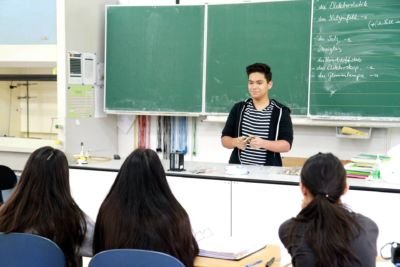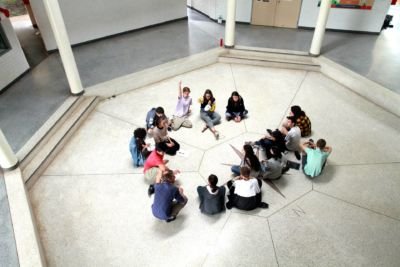Degrees & Certificates
The Standing Conference of German Ministers of Education and Cultural Affairs (Kultusministerkonferenz – KMK) recognizes the challenges of the international education market; in 2005, it issued the Regulations for the German International Abitur Examination (DIA) for German schools abroad. Bilingualism (German/English) and independent learning are important aspects of the examination. The DIA incorporates English-language components into the evaluation of higher education and thus accommodates the specific character of schools abroad.
In keeping with this standard, CDSC teaches history classes bilingually (German/English) beginning in the 8th grade and teaches physics solely in English beginning in the 10th grade. In addition to the traditional domestic Abitur, the DIA also holds a colloquium as a further examination component. By completing the DIA successfully, students obtain the general higher education entrance qualification and thus are granted the graduation qualifications necessary to enroll at a German university or to pursue a comparable international education.
A student who leaves the school prior to or without passing examination can be awarded the academic part of the Fachhochschulreife by the examining supervisor.
The quality of graduation certificates at German schools abroad is supervised by the Federal Government-Federal States Committee for Schools Abroad (Bund-Länder Ausschuss für schulische Arbeit im Ausland – BLAschA). Tha BLAschA consists of one representative of the cultural administration of each federal state, the chairman of the schools department of the German Foreign Office and the chairman of the Central Agency for German Schools Abroad. The BLAschA mandates that an examination appointee be personally present on a regular basis during the DIA exams at schools abroad. In comparison to many other international school certificates, this ensures a consistent quality of the school certificates and, above all, the equivalence of certificates acquired at a German school abroad compared to domestic certificates. The higher education entrance qualification obtained with the DIA also distinguishes the German school system from those of other countries, where this qualification is generally not automatically obtained through school certificates.


After finishing the 10th grade and taking a final exam, students on the Realschule educational path receive their Realschule-certificate. The final exam consists of two written tests in a combination of German, English or mathematics and one oral test.
An expanded Realschule-certificate allows students to transfer from the Realschule course of education to a Gymnasium course. Upon receiving the expanded Realschule-certificate, students then repeat the 10th grade at the Gymnasium.
Students on the Gymnasium course of education automatically receive a Realschule-certificate upon entering the 11th grade.
The CDSC is authorized by the German Standing Conference of Ministers of Education and Cultural Affairs (KMK) to award Realschule-certificates. Examination procedures are carried out by examiners from the Federal Government-Federal States Committee for Schools Abroad (BLAschA).
The 10th grade plays a unique role at CDSC: It is the concluding year of the Realschule (based on the G8-system which includes 5 years of preparation for the Realschule-certificate), i.e., secondary education I. It is also the first of the upper-level Gymnasium years (three years in total, making up secondary education II).


At the end of 9th grade, students on the Hauptschule course of education take a final exam to receive their Hauptschule-certificate. The final exam consists of one written test in either German or mathematics and at least one oral test.
Students on a Realschule or Gymnasium course of education automatically receive a Hauptschule-certificate upon entering the 10th grade.



